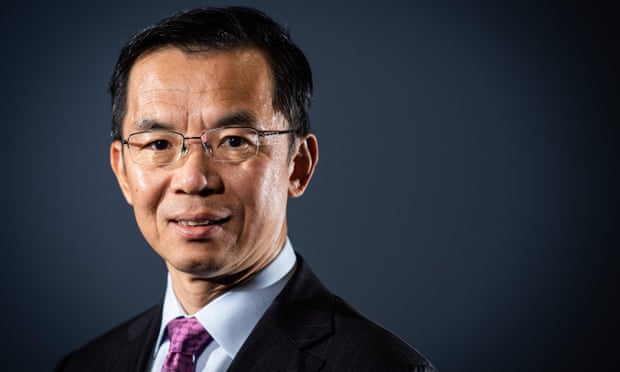Baltic states condemn China envoy’s remarks over sovereignty of ex-Soviet nations
France, Estonia, Latvia and Lithuania have expressed dismay after China’s ambassador in Paris questioned the sovereignty not only of Ukraine, but all the former Soviet Republics including the Baltic states.
Lu Shaye’s remarks in a TV interview late on Friday raise fresh questions about the faith the French president, Emmanuel Macron, has placed in China to act as a mediator between Russia and Ukraine.
Lu had been asked whether he considered the peninsula of Crimea, which was annexed by Russia in 2014, part of Ukraine under international law.
“Even these ex-Soviet Union countries do not have effective status, as we say, under international law because there’s no international accord to concretise their status as a sovereign country,” Lu said.
Lu’s comments appeared to brush aside the sovereignty of countries, including ironically Russia, that formally recognised each other after the Soviet Union’s dissolution and are represented at the United Nations and in European security organisations.
Asked if Crimea was part of Ukraine, he said the answer depended on one’s position, and it was not so simple.
He added: “There is a history here where Crimea was originally part of Russia. It was Khrushchev who offered Crimea to Ukraine during the period of the Soviet Union”.
France officially reacted by saying it heard his remarks with dismay and demanded to know if they reflected China’s official position, “which we hope not to be the case.”
“We stress our full solidarity with all of our allies and partners concerned, who have gained their long-awaited independence after decades of oppression,” a French Foreign Ministry spokesperson said. “The annexation of Crimea by Russia in 2014 is illegal under international law.”
Ukraine was recognised “within borders including Crimea in 1991 by the entire international community, including China, at the fall of the USSR as a new member state of the United Nations”, Paris said.
The French president’s diplomatic adviser, Emmanuel Bonne, has been deputed to hold talks with China to explore a possible peace initiative, a move that has alienated many in Europe.
The Latvian foreign minister, Edgars Rinkēvičs, said the Chinese ambassador’s comments were “completely unacceptable”.
“We expect [an] explanation from the Chinese side and complete retraction of this statement,” he said, adding there would be “a strong and unified response” from the EU at a meeting of European foreign affairs ministers in Brussels on Monday.
Estonia’s foreign ministry summoned China’s ambassador to Estonia to clarify the country’s position over its country’s sovereignty, calling Shaye’s position “incomprehensible”.
Estonia pointed out that since 1994 China had recognised the Budapest memorandum agreement under which Russia accepted Ukraine’s borders and Kyiv agreed to hand over its Soviet-era nuclear weapons.
Lithuania’s foreign minister, Gabrielius Landsbergis, said the Chinese ambassador’s remarks demonstrated why European countries had little faith in China’s ability to play a constructive role in brokering peace.
“If anyone is still wondering why the Baltic states don’t trust China to ‘broker peace in Ukraine’, here’s a Chinese ambassador arguing that Crimea is Russian and our countries’ borders have no legal basis,” he said on Twitter. He said the Chinese ambassador to Lithuania was being summoned on Monday to provide an explanation.
Lu’s comments appeared to contradict China’s position paper on Ukraine issued in February, which pledges to uphold “the sovereignty, independence and territorial integrity of all countries … big or small”.
In a related development, Brazilian president, Luiz Inácio Lula da Silva, on a visit to Portugal was forced to make some of his strongest criticisms of Russia’s invasion, after appearing to be entirely neutral in the conflict on a visit to China last week.
In Lisbon, he said: “The war should not have started. Russia should not have invaded, but it did. The fact is that it happened. So instead of choosing sides, I want to find a third way, the construction of peace.” Ukrainians protested outside the Brazilian embassy in Lisbon calling Russia a terrorist state.
Last weekend, Lula said Europe should stop supplying arms to Ukraine since it was prolonging the conflict, a position that would leave the aggressor and victim treated in the same way. He made his remarks shortly after visiting China’s president, Xi Jinping.
The Brazilian president, offering himself as a peace broker, met the Russian foreign minister, Sergei Lavrov, in Brasília last week but has never met any senior Ukrainians. Lavrov has praised Lula for “his clear understanding of the genesis of the situation”.
The White House has accused Lula of “parroting Russian and Chinese propaganda without looking at the facts”. The concern in Washington is that countries such as Brazil, eager to build their trading relationship with China, are determined to ignore the Ukraine issue knowing that China wants Russia protected from defeat.
The UK foreign secretary, James Cleverly, will set out Britain’s approach to China in a major speech on Tuesday. No senior British figure has been to China since the country’s economy opened up after Covid.





Post a Comment